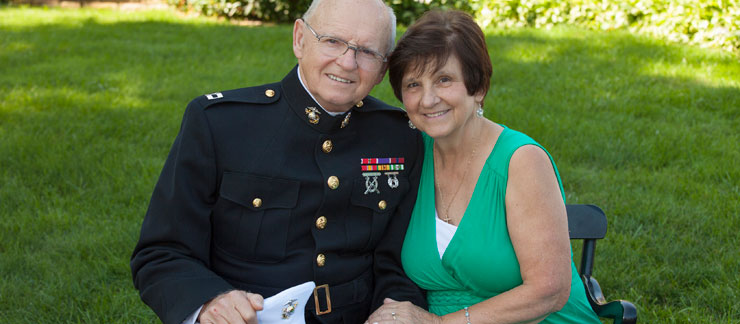
Understanding “Veterans’ Culture” When Caring for an Aging Vet
Veterans possess a level of love and loyalty that stems from their service time, but the baggage from service can last forever. And when they reach an age where they may require daily assistance within the home, it can be challenging. There's a veteran's culture of sorts, which needs to be understood to gain the trust and respect of the veteran.
Lisa Grote, whose father is a Vietnam veteran, found joy in giving back what vets have given to the American people: service rooted in love for others.
“When taking care of a veteran, always be aware that there may be something deep down inside of them that makes them who they are as very proud, strong and self-reliant people,” says Lisa, a former caregiver. “Listening to their stories, admiring the way they live their lives, despite the nightmares inside them – that goes a long way.”
For a veteran needing assistance at home, it can be a hard time in their life to realize that they no longer possess the level of autonomy they’ve always had. They need help, and many proudly push back against that reality. Here are some tips for consideration when providing care for a veteran.
Understanding “Veteran’s Culture”
There is no one way to care for a veteran because each situation is different. There’s a veteran’s culture of sorts, and by understanding it, you can at the very least understand your aging veteran, which can help improve a relationship with this person and warm them to the idea of outside assistance. Learning the veteran's schedule is critical in establishing trust early on, Lisa says. Veterans are punctual and very structured (i.e., making the bed every day), so calendar scheduling for appointments and events can help establish much-appreciated structure.
Many veterans respect those who demonstrate many of the qualities they have in themselves. “Ethics are a standard of behavior you set for yourself, so honesty and working hard to the best of your ability is what they will admire about you,” Lisa adds. In this experience, you will understand that learning to care for a veteran takes practice and patience.
Many Veterans Desire Control Over Their Situation
Of course, they do – many people do. But remember, there’s a heightened sense of pride (maybe even ego) when dealing with vets, especially ones who gave a great sacrifice during their time. During long hours of caring for the veteran, a caregiver can make them feel comfortable by merely listening to stories from their past. Keep in mind that some veterans may not be politically correct – understand that their frustration may even stem from their gradual loss of control and autonomy.
Whenever possible, the caregiver and the veteran should make decisions together as a team because this can help your veteran feel in control. Furthermore, Lisa suggests a caregiver with thick skin to deal with aging veterans who may be insensitive or irritated with their situation. “A smart compromise is to let them still be in control, but helping to guide them along the way so that they may still feel the dignity they deserve,” she says. “Veterans come in all religions, races and creeds (and) being respectful goes without saying. It is important that you remain nonjudgmental when interacting with your veteran. In turn, they may be interested in your own beliefs and are sometimes impressed by what you stand for.”
Of course, the conversation should focus on your loved one; however, use your best judgment – if you get to a point where the veteran is comfortable enough to discuss your own beliefs, consider withholding information you think may upset him or her.
Building Trust
As a family caregiver, you may think you know a lot about your veteran loved one, but there may be many things you don’t know. You will need to learn about the veteran’s medical, legal and financial issues. Getting this personal isn’t easy, but it will help you in planning for the future. "Love, compassion and empathy for the elder are important to keep in the forefront as you interact with them on a daily basis," Lisa says. "Sometimes it is your companionship that is special to them and allows them to open up and provide you with the information you need.” And that’s important because you may need to know about your veteran loved one’s income, bank accounts, wills and insurance policies. Also, learn as much as you can about the veteran's health. Hopefully, if your loved one has reached a point where he or she needs daily home care, a care plan has already been created.
Make Your Veteran a Priority
You may feel pulled in different directions as a family caregiver holding down a full- or part-time job or providing for your household – and in some cases, that can disrupt your veteran and make him or her not feel like a priority. So it’s a good practice to ensure you take care of personal matters when not providing care. For example, make personal phone calls on a lunch break instead of during work. Don’t be on your cell phone browsing social media while the veteran is trying to speak with you. You should do everything possible to ensure he or she feels like an utmost priority. And in turn, your veteran loved one may be more inclined to cooperate with you or a professional caregiver.
For more information on vital resources veterans can use to help pay for care, click here.
